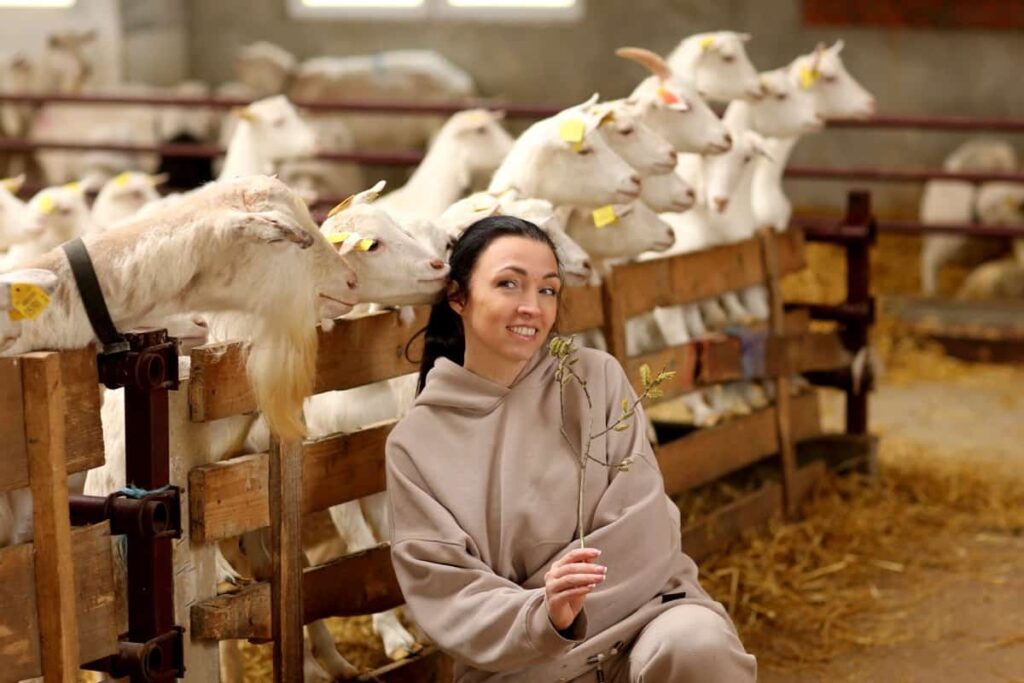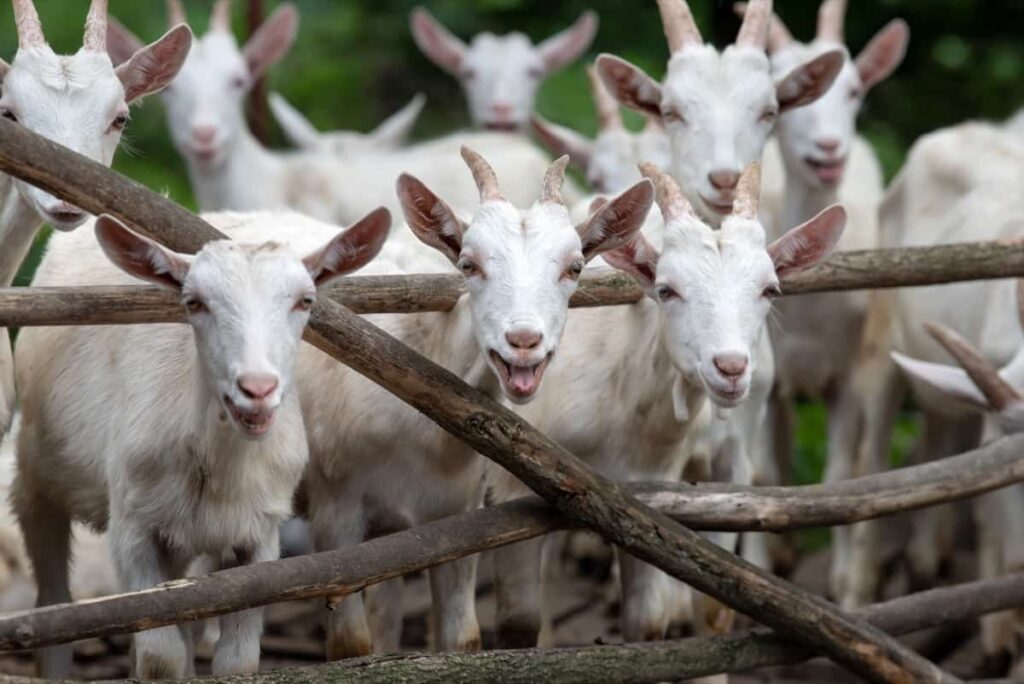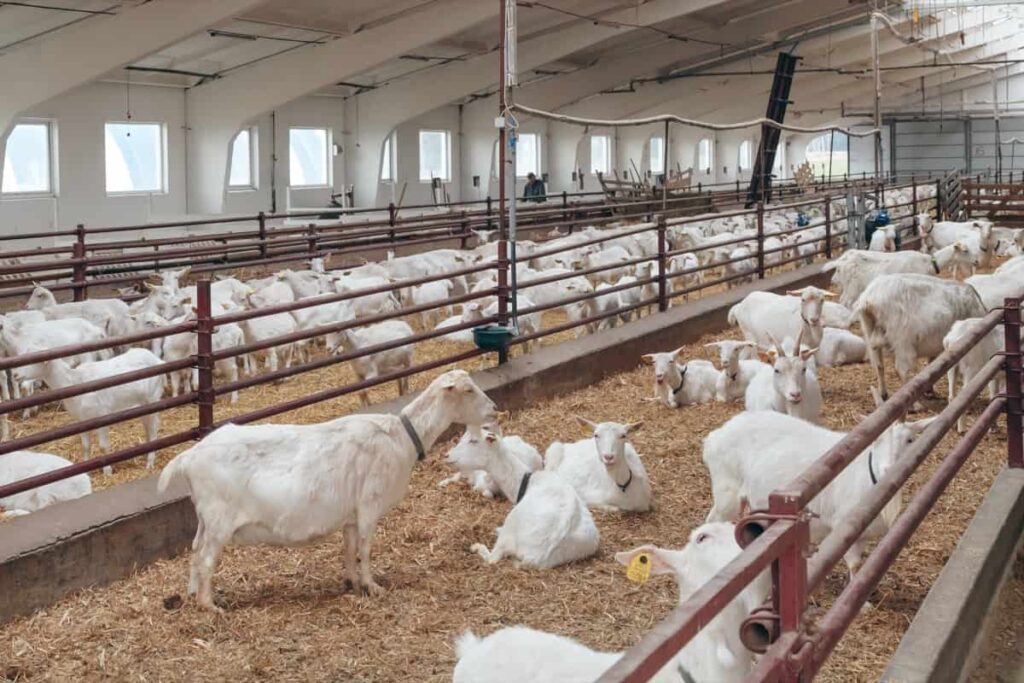Goats need a safe and secure shelter that protects them from extreme weather conditions while allowing good ventilation. They can thrive in harsh conditions where other livestock may struggle. This makes goat farming a viable option in many regions around the world. Goat farming is a popular choice for farmers and entrepreneurs around the world.

Goat Farming Questions and Answers
What is Goat Farming?
Goat farming is the practice of raising goats for various purposes. These versatile animals have been domesticated for thousands of years and are valued for their meat, milk, fiber, and even as pets or companions.
What Types of Goats Can You Raise on a Farm?
Meat Goat Farms: These farms focus on raising goats for meat production. They typically breed and raise specific breeds known for their meat quality, such as Boer or Kiko goats. These farms may also prioritize selecting goats with fast growth rates and good meat conformation.
Dairy Goat Farms: Dairy goat farms specialize in milk production. Goats bred for dairy purposes produce high-quality milk to make various dairy products like cheese, yogurt, and butter. Breeds commonly found on these farms include Saanen, Alpine, or Toggenburg.
Fiber Goat Farms: Fiber goat farms primarily focus on raising Angora or Cashmere goats for their luxurious fibers, which can be spun into yarn or used in textile industries to make clothing items like sweaters and scarves.
What are the Benefits of Raising Goats?
- One of the major advantages is their ability to adapt to various climates and environments, making them suitable for farming in different regions. Goats can thrive in a hot desert or a cold mountainous area and provide you with milk, meat, fiber, and even companion animals.
- Another benefit of raising goats is their low maintenance cost compared to other livestock.
- In addition to being low-maintenance, goats also have high reproductive rates.
- Furthermore, goat manure is an excellent natural fertilizer that enriches soil health by increasing organic matter content and nutrient availability.
How Do You Start a Goat Farm?
- Firstly, you must secure the right location for your goat farm. Next, you must decide what type of goats you want to raise. Many different breeds are available, each with unique characteristics and benefits.
- Once you’ve selected your breed, sourcing healthy and quality animals from reputable breeders or farms is important.
- In terms of infrastructure, constructing sturdy fencing is essential to keep your goats safe and contained within their designated areas.
- Feeding your goats a balanced diet is crucial for their overall health and productivity.
- Regular veterinary care and vaccinations help prevent common diseases such as tetanus, pneumonia, and parasites like worms which can significantly impact the health of your herd.
How Much Land Required for Goat Farming?
Approximately ten acres of land would be required for a larger-scale farm with around 500 goats, including space for shed construction. This allows ample grazing area and enough room to accommodate all the necessary infrastructure. However, starting with a smaller quantity of goats, say around 50 animals, you can get by with just one acre of land. This means adjusting your expectations accordingly in terms of production capacity and profitability.
In case you missed it: Innovative Housing and Shelter Designs for Profitable Goat Farming

What Breeds Are Best Suited for Goat Farming?
- Boer Goats: These are known for their fast growth rate and high meat production. They have a good feed conversion ratio and excellent carcass quality, making them ideal for meat production.
- Saanen Goats: If you’re looking for dairy goats, Saanens are a great choice. They produce large quantities of milk with high butterfat content. These goats are also easy to handle and adapt well to various climates.
- Nubian Goats: Nubians are popular dairy goats with a higher butterfat content in their milk compared to other breeds. They also have long ears and a friendly disposition, making them great pets.
- Alpine Goats: Alpine goats are versatile animals that can be used for both milk and meat production. They have good udder capacity and produce high-quality milk with moderate butterfat content.
What Kind of Fencing Is Needed for a Goat Farm?
- The right kind of fencing is crucial for the safety and security of your goats, as well as to protect them from predators and keep them within their designated areas.
- Consider using woven wire or electric fences to keep goats contained.
- Furthermore, regularly inspect your fences for any signs of wear and tear. Repairing or replacing damaged sections promptly will help maintain an effective enclosure.
What Basic Equipment Do You Need to Raise Goats?
- Shelter: Goats need a sturdy and secure shelter to protect them from extreme weather conditions. A simple shed or barn with proper ventilation will suffice.
- Fencing: Strong fencing is crucial to keep your goats contained and safe. Use woven wire or electric fencing at least 4 feet high to prevent escapes.
- Feeding Equipment: Goats require specialized feeding equipment such as feeders and water troughs.
- Milking Supplies: If you plan on milking your goats, you will need supplies like milk buckets, teat dip cups, milk filters, and storage containers for milk.
- Hoof Trimming Tools: Regular hoof trimming is necessary to maintain healthy hooves in goats. Invest in quality hoof trimmers or shears designed specifically for goat hooves.
What Do You Feed Goat Farming?
Several options provide them with the nutrients for their growth and overall health. Cereal grains such as rye, oats, moil, corn, and barley are highly enriched with carbon and energy. These grains serve as an excellent source of carbohydrates for goats. In addition to cereal grains, protein is also essential in a goat’s diet.
It’s important to note that while these feed options are beneficial for goats’ nutrition needs, they should be provided alongside fresh grass or hay. Goats are naturally inclined towards browsing vegetation rather than solely relying on grain-based diets. A well-balanced diet that includes carbohydrates from cereal grains and proteins from various sources will help ensure your goats remain healthy and thrive on your farm.
Is it Necessary to Vaccinate Goats?
Vaccination plays a crucial role in the overall health and well-being of goats. Vaccinating your goats is necessary and a responsible practice that every goat farmer should follow. When it comes to vaccinations for goats, there are several key diseases that you need to protect against.
In case you missed it: Goat Breeding and Genetics for Improved Productivity and Disease Resistance

What Are Some Common Challenges Faced When Raising Goats?
- First and foremost is predator control. Goats are natural prey animals that attract predators such as coyotes, wolves, or neighborhood dogs. It’s important to have secure fencing to protect your goats from these potential threats.
- Another challenge is maintaining proper nutrition for your goats. While they are known for their ability to eat almost anything, providing them with a balanced diet that meets their nutritional needs is crucial.
- Goats are also prone to various health issues like parasites and diseases. Regular deworming and vaccinations are essential preventive measures to keep your herd healthy.
How Do You Care for a Goat?
- Provide a clean, dry, and well-ventilated shelter for your goats. It should protect them from extreme weather conditions and predators.
- A balanced diet includes high-quality forage, grains, minerals, and fresh water. Goats also enjoy browsing on leaves and shrubs.
- Regularly vaccinate your goats against common diseases like tetanus, pneumonia, and clostridium perfringens types C & D. Consult a veterinarian for proper vaccination schedules.
- Implement a deworming program to prevent internal parasites in your herd. Monitor their fecal samples periodically to assess the presence of worms.
- Goats are social animals that thrive in herds or pairs; avoid keeping them alone if possible. They need companionship for mental stimulation and overall happiness.
Conclusion
Goat farming plays a significant role in sustainable agriculture practices. Goat farming offers numerous benefits, such as a profitable return on investment and a sustainable source of income.
- Types of Grass Growing for Goat Farm
- How to Train Goats for Milking: A Beginners Guide
- Goat Milking Practices and Equipment: A Beginner’s Guide
- Goat Farming for Fiber: Producing Mohair and Cashmere
- Maximizing Goat Milk Production: Tips for Dairy Goat Farmers
- Goat Farming as a Family Business: Strategies for Success
- Profitable Kenya Goat Breeds for Commercial Dairy and Meat Business
- Unlock the Secrets of Oberhasli Goat: Discover Raising and Management Practices
- Ultimate Guide to Myotonic Goats: Explore Profile to Raising
Hi,
I have read the information for beginners and others information and I am happy with it.
Thanks.
hi you given good information on goat farming, but i need information how to evaluate the fattenning procedure through process
You can read here about Goat Fattening.
Your informations are utmost on goat farming. I also plan to start goat farm very soon. But prior to start goat farm i want to take proper training on goat farming. Bcoz i don’t have proper knowledge on goat farming.
So do you give training on goat farming. Kindly help me.
Thanking you.
In West Bengal, which goats are suitable for farming?
Please share project report for 50 female and 10 male goats (black bengal or beetle goats) realistic to 2019,
Mail id given
Thanks
In karnataka which goats are suitable for business?
um can someone help me my Nubian goat has some signs of birthing but also has worms, so I don’t know if she’s sick or giving birth a month early?
Very Much happy to go through the details for beginners. I want to get into commercial Goat farming to Start off in 6acres. And after the results on how things work around will accordingly plan expansion.
All details provided is definitely going to be very Helpful..and look forward for more inputs of details regarding the same as and when required.
Thanks and Regards.
very happy about your information, Thank you. contact you soon.